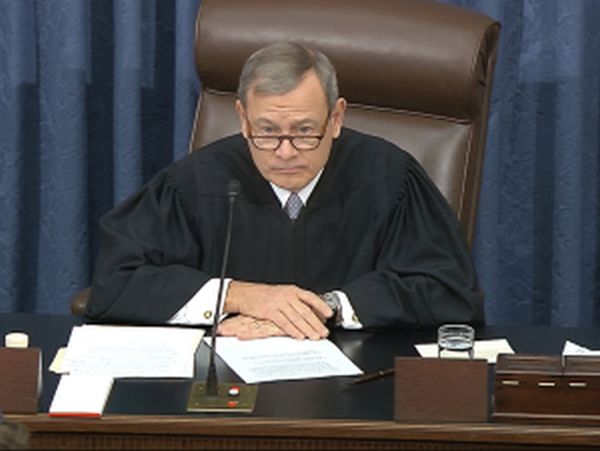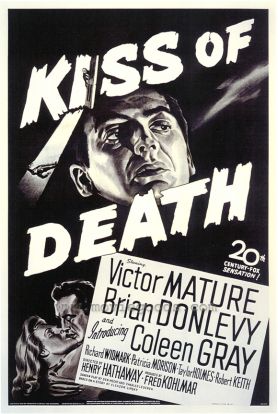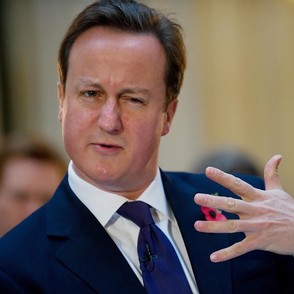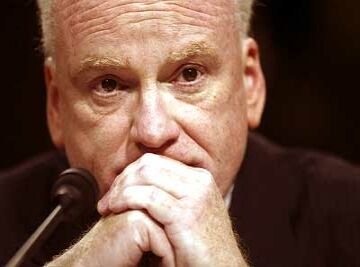Irony deficiency
After the second assassination attempt against Donald Trump in just over two months, the media’s reactions were once again more shocking than shocked. What was only gracelessness, back in July, was now compounded by an affected cynicism meant to imply that, if the attempts were not actually staged by the candidate himself, they were at least dismissible as part of his histrionic style of campaigning. Once again, too, there was no mitigation of their attempts to stoke the fear of a second Trump presidency as a “threat to democracy” — a fear which was plausibly identifiable as a motivating factor to both of the would-be assassins.
As in July, too, we were treated to the media’s pro forma denunciations of generalized “political violence” (see “Ear’s breadth escape” in The New Criterion of September, 2024). In the Los Angeles Times, this was followed, without so much as a pause for breath, let alone for reflection on the media’s own role in provoking such violence, to speculation as to how the attempted murder at Mr Trump’s Mar-a-Lago Golf Club would (or wouldn’t) play out politically.
Nor had the intervening two months of reflection diminished the number of commentators who sought to imply either that the violence was coming from both sides (J.D. Tuccille of Reason)
or even that Mr Trump himself had somehow inspired the attempts on his life by his own intemperate rhetoric. “At the heart of today’s eruption of political violence,” wrote Peter Baker of The New York Times “is Mr. Trump, a figure who seems to inspire people to make threats or take actions both for him and against him.”
He cited in evidence of the former president’s supposed inspiration to violence the Trump scandal of the week — his mention of the alleged culinary habits of some of the thousands of soi-disant asylum seekers from Haiti now living in Springfield, Ohio. Likewise Lester Holt of CBS News:
Today’s apparent assassination attempt comes amid increasingly fierce rhetoric on the campaign trail itself. Mr. Trump, his running mate JD Vance continue to make baseless claims about Haitian immigrants in Ohio.
The original headline to a letter to the editor of The Cincinnati Enquirer read: “Opinion: There is no place in politics for violence. That said, the former president, Donald Trump, brings a lot of this stuff on himself.” This was later changed — with a brief note to the effect that “This headline has been updated to meet our standards” — to the non sequitur: “There’s no place for violence in politics. Trump’s lies and rhetoric must stop.” The wording of the letter itself remained unchanged.
The former president was also faulted for calling on those of his many detractors who have not yet turned to violence against him to moderate their provocative rhetoric. “Trump, Using Harsh Language, Urges Democrats to Tone Down Theirs,” headlined The New York Times. Tom Nichols of The Atlantic insisted that “No other president has used an assassination attempt to inflame American politics the way Donald Trump does,” mentioning Gerald Ford, whose would-be assassins (from the Manson “family”) had highly idiosyncratic political motivations, if any.
In any case, I’d have thought that the assassination attempts suggest that American politics is already pretty inflamed. But Tom’s sense of irony, or lack of it, is apparently in the same league with that of Peter Baker of the Times, mentioned above, whose criticisms of the would-be assassin’s victim included this ironic coup: “Mr. Trump does not pause to reflect on the impact of his own words.”
Well, there’s a lot of it about. But the most spectacular progressive irony deficiency of the month came from the inimitable Michael Tomasky of The New Republic, who noted, in looking ahead to the Trump-Harris debate, that “Trump Has One Debate Strategy: Try to Get America to Hate Harris.”
Way back in 2018, there was a brief spate of internet scare stories about something their authors called “irony poisoning,” supposed at the time to be one of the baleful political consequences of our increasing addiction to social media. Basically the idea was the same as that of your mother’s warning to you as a child that if you keep screwing up your face like that it will get stuck that way. In the same way, thought those who came up with the idea of irony poisoning, internet trolls who were making jokes about 9/11 or school shootings or, in Europe, an influx of Syrian refugees would soon find themselves sharing the views of terrorists or school shooters or violent xenophobes — and maybe even imitating their crimes.
That sounds to me more like irony failure than irony poisoning. But that “irony” was getting blamed for radicalizing tendencies on social media, by people who were themselves radical opponents of free speech, was itself highly ironic. For irony, properly understood, is death to intellectual certainty and to self-righteousness, both of which are defining characteristics of the ideological left. If there is a sickness unto death that you can catch from internet memes and social media — not to mention the many other contemporary sources of contagion in the non-social (or anti-social) media — it is not irony poisoning, assuming that there were such a thing, but fear. And fear takes away our sense of a common humanity with the person we fear — the sense that a sense of irony might restore.
I dislike the idea of the pathologization of our political culture, but sometimes there’s no other explanation for the course it has taken, as the late Charles Krauthammer must have realized when, as a trained psychiatrist, he came up with the idea of Bush Derangement Syndrome — which is to its successor ailment, Trump Derangement Syndrome, as SARS-CoV-1 is to SARS-CoV-2. And in both cases the infectious agent is fear.
It is not possible that half of the country can have gone crazy enough to vote for an updated version of Adolf Hitler. It is possible, however, that the half of the country susceptible to seeing in George W. Bush (or Donald Trump) a new Hitler are victims of popular hysteria built on the fear that the other, the “deplorable” half of the country, could be so crazy. We now once again find ourselves being invited to share in this fear of “the other,” and we would be well-advised not to forget that the Democratic party and their propaganda arm in the media are basing their bid to be entrusted with political power primarily on the basis of an appeal to it.
None of this is meant to imply that Mr Tomasky is necessarily wrong to write that Mr Trump’s debate strategy was to stir up fear and thus hatred against Kamala Harris — only that the Democratic strategy to stir up fear and hatred against Mr Trump goes back a lot further and encompasses a whole-campaign — indeed, a multi-campaign — game-plan in which it has had the invaluable assistance of the media, the arts, education and even much of corporate America. Mr Trump, insofar as he might have been thought to induce his supporters to hate Ms Harris, could have done very little to fight back against such a massive fear campaign in its own terms.
Nor is the New York Times article cited above wrong to note that “Former President Donald J. Trump . . . claimed ‘inflammatory language’ from Democrats had provoked what the authorities are investigating as an assassination attempt against him, urging his rivals to tone down their speech even as he called them the ‘enemy from within’ and ‘the real threat’.” Well, yes. But the mote in the eye of Mr Trump’s irony deficiency hardly compares to the beam in that of The New York Times.
Madeleine Kearns of The Free Press provided us outsiders with a glimpse into an intramural squabble among media types towards the end of September:
Last week on Real Time with Bill Maher, MSNBC’s Stephanie Ruhle all but endorsed Kamala Harris for president. Dressing down New York Times columnist Bret Stephens for arguing that Harris had to do more to earn his vote, and that the vice president owed the American people a better explanation of her policy positions, she said: “Kamala Harris is not running for ‘perfect.’ She’s running against Trump. We have two choices.” “I don’t think it’s a lot to ask her to sit down for a real interview as opposed to a puff piece,” Stephens replied. Ruhle doubled down: “When you move to Nirvana, give me your real estate broker’s number and I’ll be your next-door neighbor. We don’t live there.”
Ms Kearns was understandably indignant at the suggestion that journalists could only ask policy questions of a candidate in a state of Nirvana, or when the candidate is not the only one possible of Ms Ruhle’s “two choices.”
If you’re a member of the Fourth Estate, the thing you should argue for—always and everywhere—is accountability, and you get that through asking powerful people tough questions. Maybe we’re a little old-fashioned here at The Free Press, but we think journalists should be in favor of journalism. But here was a journalist arguing against it. Ruhle’s attack on her own supposed vocation was depressing enough. But then, things got even worse. After she defended Harris for not sitting for interviews, Ruhle was rewarded by the Harris campaign. . . with an interview.
I hate to say it but the attempted irony of “Maybe we’re a little old-fashioned here at The Free Press” falls a little flat when it is so obvious that they are a little old-fashioned — in fact, a lot old-fashioned — in failing to recognize the extent to which “journalism” has become only another species of political advocacy virtually everywhere today. Even, at times, in The Free Press itself.
See, for instance, Eli Lake’s attempt to argue that Republican requests to the media-Democrat combine to moderate their rhetoric are tantamount to censorship. “Don’t Blame Political Violence on Political Rhetoric,” his Free Press article demanded. “In the wake of another assassination attempt, Trump is falling into the same trap as his enemies: equating hateful speech with hateful actions.” I have the greatest respect for Mr Lake, both as an investigative reporter (and former colleague at The New York Sun) and as an advocate for Israeli self-defense, but this is nonsense.
Genuine debate depends on civility and civility depends on rhetorical self-restraint on the part of the debaters. By equating such self-restraint with an infringement on free speech, he is implicitly acknowledging that anything like genuine debate is long gone from the American political scene and that we all now live in Stephanie Ruhle’s world, where every word from the pen or out of the mouths of our journalistic advocates must be calculated either to boost one’s own candidate or damage the electoral prospects of the opposition.
By her own lights, Ms Ruhle is right that mere puffery towards Ms Harris and pure hatred, fostered mainly by scandal mongering, towards Mr Trump is what journalism now is and not any kind of “vocation.” Those who oppose her, like Bret Stephens or Eli Lake or Madeleine Kearns (or myself) no longer have the option, any more than Mr Trump has, to step outside of that nightmare world of the perpetual clashing of ignorant armies and back into the lost Nirvana of civilized debate. Everything they say — everything any of us say — will be automatically discounted as being intended as a fillip either to one side or the other, and we’ll only confuse each other, and ourselves, if we fail to pick a side and stick to it.
But it is always the progressive ideologues who are the first to break down the civilized norms of debate, and always on the plea of having to respond to some over-riding emergency that leaves no intellectual or moral or emotional space for such debate — the emergency of Vietnam half a century or so ago and, later, the emergency of the Iraq War, or climate change, or “settler colonialism” or Donald Trump. We forlorn conservatives who try to cling to the comparatively civilized norms of pre-revolutionary days too often end up as dupes of the progressives when we uphold their useful fiction that public life in America would return to its pre-revolutionary normal were the emergency to subside and Donald Trump mysteriously to disappear — or die.
For it is also the case — is it not? — that the logic of Stephanie Rule’s high-stakes politics of either/or is the friend of the assassin who, when the alternative to Nirvana is the monster Trump, is inevitably called into existence, especially if it begins to look as if the fear and hatred of the good people, of the sane and decent people, may not be enough to save us from the catastrophe of another Trump presidency.
In an interesting piece written for Ruy Teixeira’s “Liberal Patriot” Substack at the beginning of October, John Halpin asked “What Exactly Are We Fighting About?” Polling data, apparently, is all over the place in response to questions about what matters most to people about the election, or what they are looking for in a candidate. “Despite the sporadic focus on the economy from Trump and Harris,” he writes, “the two candidates and their partisan armies mainly prefer talking to their respective bases about a litany of concerns grounded in hatred of the other side.”
Elections don’t follow the old scripts anymore with the two parties waging a fierce but mostly confined ideological fight over the proper size and role of government, the focus and distribution of public resources, and relative attention allotted to certain groups and areas of the country — issues and priorities that can at least be handled through legislation. In place of the old model, the 2024 election is mostly a cultural battle, with issue priorities serving as proxies in the real fights over wildly divergent personalities, preferred groups of Americans, and increasingly incompatible value systems. No party truly wins in this scenario — the culture war rages on.
Mr Halpin seems bewildered by this. But if we ask Cui bono? the picture, I think, becomes a little clearer. The key lies in that word “truly” in his last sentence. The Democrats don’t care about truly winning. Just winning, by any means necessary, is enough for those whose only real policy is to get into power and to stay there. And as they know they can’t win on policy, or on the personal magnetism of their human cipher of a candidate, they concentrate every resource on fanning the flames of popular hysteria and hatred to persuade waverers that the election is a contest between good and evil. They also know that Republicans are much less good at this game and command many fewer media weapons with which to carry it on — and, most importantly, that they don’t seem to know how not to play it. Perhaps none of us does anymore.
Discover more from James Bowman
Subscribe to get the latest posts to your email.







